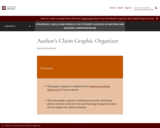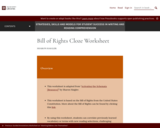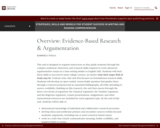
Activity for HIST 1301: United States History I (Module 9)
- Subject:
- U.S. History
- Material Type:
- Activity/Lab
- Author:
- Jessica Herzogenrath
- Kaitlyn Ross
- Regan Murr
- Date Added:
- 11/08/2022

Activity for HIST 1301: United States History I (Module 9)

This resource contains activity handouts and considerations for facilitators. This resource is part of the Teaching Excellence Toolkit to help accomplish the College Readiness Goal: I want students to persist through challenges and failures.Activity Description:In this writing activity, students envision a future in which they are successful in the course, and reflect on strategies they need to make the success happen.
![Annotated Bibliography [Assignment/Rubric]](https://img.oercommons.org/160x134/thecb-production/media/screenshots/aeb1599ddf9f8502ad6f027055c0bf0baac6a485c0c1744daa13534eb040d26a.png)
Upon successful completion of this assignment, students will
- analyze five sources that reflect a supporting or opposing stance on the student’s chosen topic.
- create an annotated bibliography that follows the conventions of the genre, such as following APA formatting guidelines, summarizing sources, evaluating source credibility, and explaining the relevance of each source to the research argument.
Author: Kimberly Stelly
Editor: Mary Landry, C. Anneke Snyder
Supervisor: Terri Pantuso
![Annotating Texts: Developing an Evaluative Essay [Assignment/Rubric]](https://img.oercommons.org/160x134/thecb-production/media/upload/materials/images/Screen_Shot_2024-05-28_at_4.47.03_PM.png)
Upon successful completion of this assignment, students will
- analyze the concepts of “segregated coexistence” and “living in community” as proposed by Nicholas Ensley Mitchell in order to evaluate the situations described in the provided articles regarding food security, gentrification, and urban development.
- use Mitchell’s framework to evaluate the quality of diversity in their local college or community context.
Author: Christopher Manes
Editor: Mary Landry, C. Anneke Snyder
Supervisor: Terri Pantuso

With this graphic organizer, students gain practice identifying devices relevant to literary texts and reasoning through how these devices support the author’s purpose.
Author: Frances Santos
Editor: Mary Landry, C. Anneke Snyder
Supervisor: Terri Pantuso

By the end of this activity, students will be able to demonstrate their understanding of the First, Second, and Third Amendments of the Bill of Rights by completing a cloze exercise, using context clues and prior knowledge to fill in key terms without referencing their notes.
Author: Sharon Haigler
Editor: Mary Landry, C. Anneke Snyder
Supervisor: Terri Pantuso
![Classical Argument Essay [Lesson/Rubric]](https://img.oercommons.org/160x134/thecb-production/media/upload/materials/images/Screen_Shot_2024-05-29_at_12.26.48_PM.png)
Upon successful completion of this assignment, students will
- create a persuasive classical argument following the Aristotelian structure, including an introduction, narration, confirmation, counterargument/refutation/concession, and conclusion.
Author: Kimberly Stelly
Editor: Mary Landry, C. Anneke Snyder
Supervisor: Terri Pantuso
![Commas and Coordinating Conjunctions [Lesson]](https://img.oercommons.org/160x134/thecb-production/media/upload/materials/images/Screen_Shot_2024-05-29_at_3.44.51_PM.png)
Upon successful completion of this lesson, students will
- analyze example sentences to determine whether a comma is needed before the coordinating conjunction based on the presence of independent clauses.
Author: Nicole Hagstrom-Schmidt
Editor: Mary Landry, C. Anneke Snyder
Supervisor: Terri Pantuso

This resource contains activity handouts and considerations for facilitators. This resource is part of the Teaching Excellence Toolkit to help accomplish the College Readiness Goal: I want students to feel like they belong in the course.Activity Description:This is a writing activity where students reflect on the relevance of what they are learning and its applications to their future goals.
![Contextual Analysis Research Unit [Resource]](https://img.oercommons.org/160x134/thecb-production/media/screenshots/525a20a1e132ff30014f37c4441b568c328d7b3dd36dcb285528fd2324b8b2d4.png)
This resource models a possible research unit for instructors interested in guiding students through contextual literary analysis. As such, this resource outlines strategies for delving into the biographical, historical, and cultural contexts of recommended mentor texts, such as ‘The Yellow Wallpaper’ by Charlotte Perkins Gilman and ‘Hills Like White Elephants’ by Ernest Hemingway. Additionally, this resource provides a suggested pacing for the unit as well as an outline and rubric for crafting and evaluating the final essay. By the end of this section, instructors will be equipped to design their own contextual analysis research unit that suits their class interests and needs.
Author: Katherine Yoerg
Editor: Mary Landry, C. Anneke Snyder
Supervisor: Terri Pantuso

This is a template workflow for Creator Communities to adapt for their own needs.

This resource has the links and recordings to all of the sessions in the 2023 D2S2 Creator Communities series.
![DIDLS Understanding Tone in Literature [Assignment]](https://img.oercommons.org/160x134/thecb-production/media/screenshots/c13ef7f80f32c72ff0940ff96f5e41e666563e20155794a80c99b5300a4a042a.png)
Upon successful completion of this assignment, students will
- analyze the tone of a given text by evaluating its diction, imagery, details, language, and structure through the DIDLS strategy
Author: Lenora Perry-Samaniego
Editor: Mary Landry, C. Anneke Snyder
Supervisor: Terri Pantuso
![Definition Essay [Assignment/Rubric]](https://img.oercommons.org/160x134/thecb-production/media/upload/materials/images/Screen_Shot_2024-05-28_at_5.43.54_PM.png)
Upon successful completion of this assignment, students will
- analyze a chosen concept through various strategies, such as its connotations, denotations, and more.
- create a well-organized essay that explains and defends a proposed definition for their chosen concept through reasoning strategies, evidence, and credible sources.
Author: Kimberly Stelly
Editor: Mary Landry, C. Anneke Snyder
Supervisor: Terri Pantuso
![Description Essay [Assignment/Rubric]](https://img.oercommons.org/160x134/thecb-production/media/upload/materials/images/Screen_Shot_2024-05-28_at_5.30.47_PM.png)
Upon successful completion of this assignment, students will
- create a well-organized essay that describes in vivid detail a significant person, place, event, moment, or object that has impacted their life or perspective.
- evaluate the effectiveness of their drafting by seeking feedback from peers and revising to improve clarity, organization, and impact.
Author: Kimberly Stelly
Editor: Mary Landry, C. Anneke Snyder
Supervisor: Terri Pantuso


![Evaluating Sources [Activity]](https://img.oercommons.org/160x134/thecb-production/media/screenshots/0397043ccdeee23554f9bc5f76302b7c7aab0c6d9afc145bab5e982821691323.png)
Upon successful completion of this activity, students will
- evaluate the reliability of a source by assessing the credibility and objectivity of its author, research methods and sources, publishing source and date, and more.
Author: Kimberly Stelly
Editor: Mary Landry, C. Anneke Snyder
Supervisor: Terri Pantuso
![The Evaluative Essay: From Reading to Rating [Assignment/Rubric]](https://img.oercommons.org/160x134/thecb-production/media/upload/materials/images/Screen_Shot_2024-05-28_at_5.04.16_PM.png)
Upon successful completion of this assignment, students will
- evaluate a given text against a predetermined rating system (unsatisfactory, needs improvement, meets expectations, exceeds expectations, and outstanding).
- compose an evaluation paper that integrates textual evidence, quotes, and paraphrases from the essay to support their ratings and overall assessment.
Author: Christopher Manes
Editor: Mary Landry, C. Anneke Snyder
Supervisor: Terri Pantuso

This unit is designed to support instructors as they guide students through the complex analytical, rhetorical, and research skills required to write advanced argumentative essays in a class setting similar to English 1302. Students will need these skills to succeed in most college courses, no matter what their major field of study may be. Content-wise, this unit first focuses on foundational research skills. Students will develop an open-ended, researchable question that guides them through a research proposal and an annotated bibliography, all while attending to source credibility. Building on this research, the unit then moves through the three core forms of argument: the Classical Argument, the Toulmin Argument, and the Rogerian Argument. Lesson presentations, assignments, and other instructional resources are included for each argument type.
Author: Kimberly Stelly
Editor: Mary Landry, C. Anneke Snyder
Supervisor: Terri Pantuso